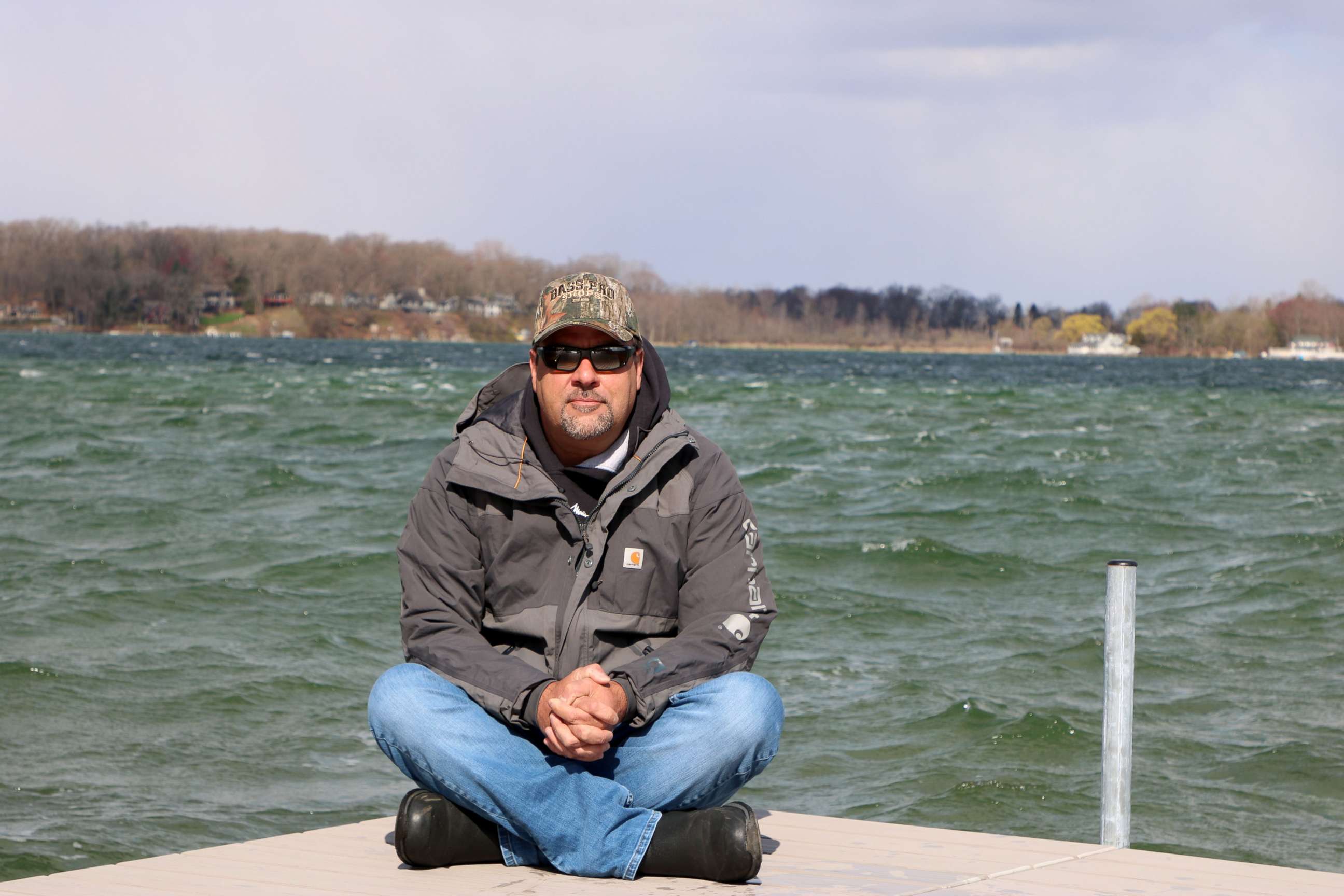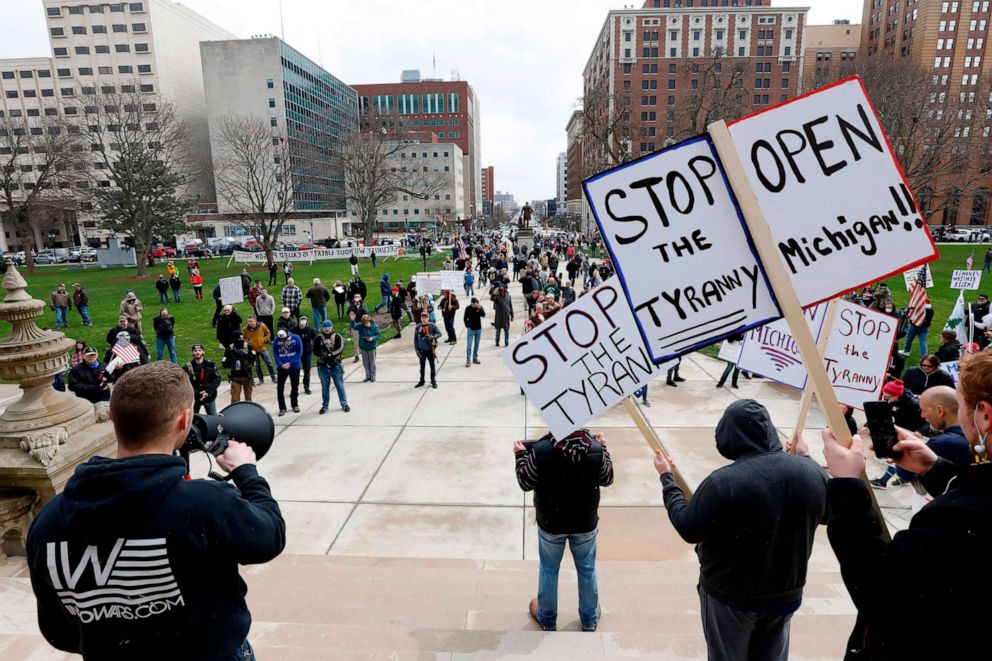Michiganders who make their livings outdoors sound off on COVID-19 orders
Outdoor Channel's Mark Zona is among those seeking an ease on restrictions.
From his home in Sturgis, Michigan, Mark Zona looks out at the choppy waters of Klinger Lake with a mixture of puzzlement and worry.
"It is crippling for me to not be on the water right now," said Zona, a professional angler and the host of "Zona's Awesome Fishing Show" on Outdoor Channel.
"I have to be on the water to work," he said. "It is hard to shoot fishing shows or videos from the shore. It's just not possible."
But Zona's fishing boats now rest in a barn on trailers. The pontoon boat he and his family use for pleasure cruises is tied up and idled. And Zona's situation is not unique.
The whir of an outboard engine is an integral element of the soundtrack of spring in Michigan, a state with more than 26,000 inland lakes and 120 major rivers. But under strict COVID-19 emergency orders issued by Gov. Gretchen Whitmer, all motorized boats have been banned until at least April 30. Violators face ticketing and potential misdemeanor criminal charges.

While the use of motor-less craft like kayaks, sailboats and canoes is allowed -- even encouraged -- under Whitmer's order, the governor and the state's department of natural resources have decided motorboating presents unacceptable public health risks, citing reports of people congregating at public boat launches and the potential for power boaters to come in contact with others at gasoline pumps or when servicing their crafts.
"The hope is that the prohibition on the use of motorized watercraft will reduce the movement of, and contact among, people, with the intent of slowing the spread of the coronavirus," reads an FAQ page on the state government website.
"I am not naive to the situation that all of us are in," Zona said. "I don't feel that I'm any different than any others. But the same time, I do feel that right now there are jobs and there are activities that can be done in a safe manner, adhering to social distancing."
The Michigan governor's April 9 stay-at-home order, which augmented a version issued in March, is widely viewed as one of the nation's most restrictive. It's been the subject of ongoing protests in Lansing, at the state capitol, and Whitmer has received on-again, off-again criticism from President Donald Trump, who, for a time, referred dismissively to her as "that woman from Michigan."
Whitmer, who's been mentioned as a potential running mate for presumptive Democratic nominee Joe Biden, has publicly and consistently defended the measures as necessary to try and control the pandemic in her state and to prevent an implosion of the health care system. Michigan has been particularly hard-hit by the COVID-19 pandemic, suffering the third-most deaths in the nation behind only New York and New Jersey. There have been at least 32,000 confirmed cases and nearly 2,500 deaths, according to state data through Monday.

The state's latest executive order bans gatherings of any size outside of household groups, forbids residents from traveling to second homes and prohibits all businesses, except for those designated as essential to sustain or protect life, from conducting operations that require workers to leave their residences.
"To suppress the spread of COVID-19, to prevent the state's health care system from being overwhelmed, to allow time for the production of critical test kits, ventilators, and personal protective equipment, and to avoid needless deaths," Whitmer's April 9 order reads, "it is reasonable and necessary to direct residents to remain at home or in their place of residence to the maximum extent feasible."
The challenges to the breadth of that order are now migrating from the state house to federal courthouses, as a growing number of businesses and residents contend that the restrictions go too far. At least six legal complaints have been filed this month, alleging that aspects of Whitmer's decrees are overbroad, arbitrary, unconstitutional.
Lawsuits against the governor have come from boaters, landscapers, property owners and individual residents who claim the orders have impermissibly restricted their businesses or their rights to move freely between homes.
"When you're talking about impacts on commerce, the courts have made very clear that you need to operate with a scalpel, not a sledgehammer," John Bursch, an attorney for the Michigan Nursery and Landscape Association, said in an interview with ABC News.
A spokesperson for Whitmer told ABC News via email that the governor's office could not comment on pending litigation.

The MNLA, which represents more than 36,000 people in landscaping, nursery and garden businesses in Michigan, argues in its suit that there is nominal public health benefit in prohibiting those companies from operating, noting that Michigan is the only state in the country to place such rigid restrictions on the industry. Many of those businesses, the group said in court filings, could safely operate with "virtually no person-to-person contact."
"On the lawn care side of things, it's one person, one truck, in a yard by themselves working," said Amy Upton, the association's executive director. "We're looking at millions and millions of dollars of impact across the supply chain. And every day that goes by, thousands and thousands of dollars more for all of our segments. Some of our members will not make it."
Whitmer's ban on motorboating also is being contested in a new case. On Sunday, the Michigan United Conservation Clubs, a statewide organization that represents anglers, hunters and other outdoor enthusiasts, filed suit in federal court. The club's members "have been left confused and frustrated" by the ban on motorized boats, according to its court filing.
"It's a prohibition of all boats with motors, anytime, anywhere, any river, any person and any body of water," said Aaron Phelps, an attorney for the conservation clubs. "This is just so wildly overbroad. And it really isn't going to do anything to address the COVID problem, because, particularly here in Michigan, lots of people live on lakes and they have their boat right out the back door."
The organizations filing suit each are seeking urgent hearings and are asking courts to issue orders that would loosen the restrictions and prevent the state from enforcing the challenged provisions. Whitmer's order expires April 30, but it's unclear if it will be extended, and in what form.
"My biggest fear is that this could carry into May. This could carry into June," Zona said. "You get to a point where I think a lot of common sense has been lost. It is illegal right now for me and my dachshund to go in my pontoon boat for a ride around the lake that I live on, alone."
If he could speak to the governor, Zona said he'd ask her to please reconsider the ban on motorboats, adding: "I feel it could be adjusted to where all of us are enjoying the water in a safe manner. For simple peace of mind, for sanity, so many families in our state right now need to be together in the outdoors."




